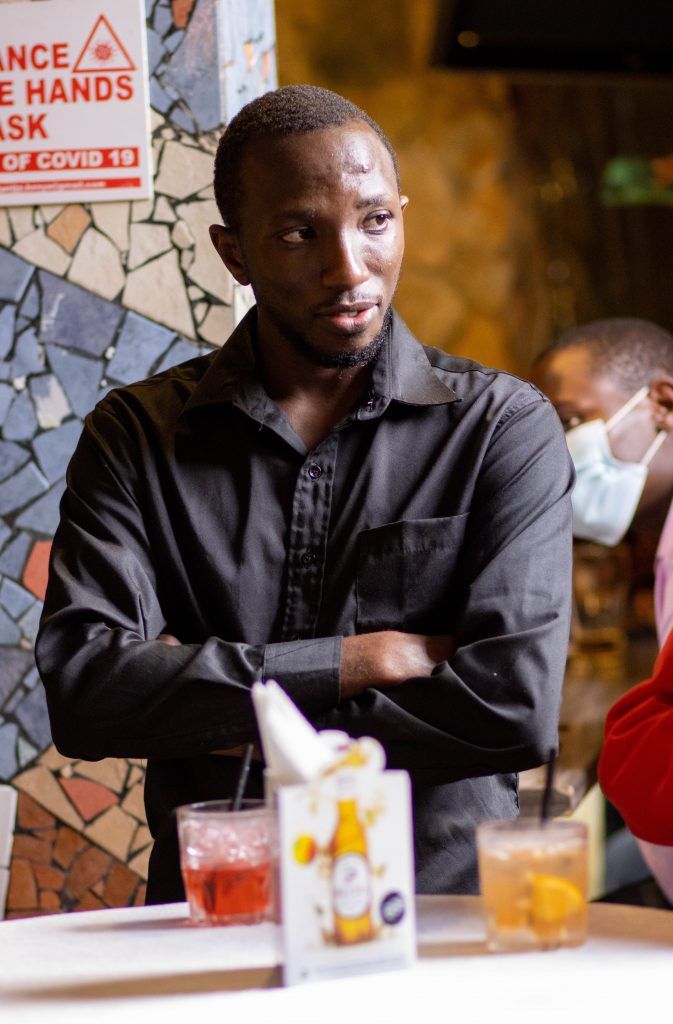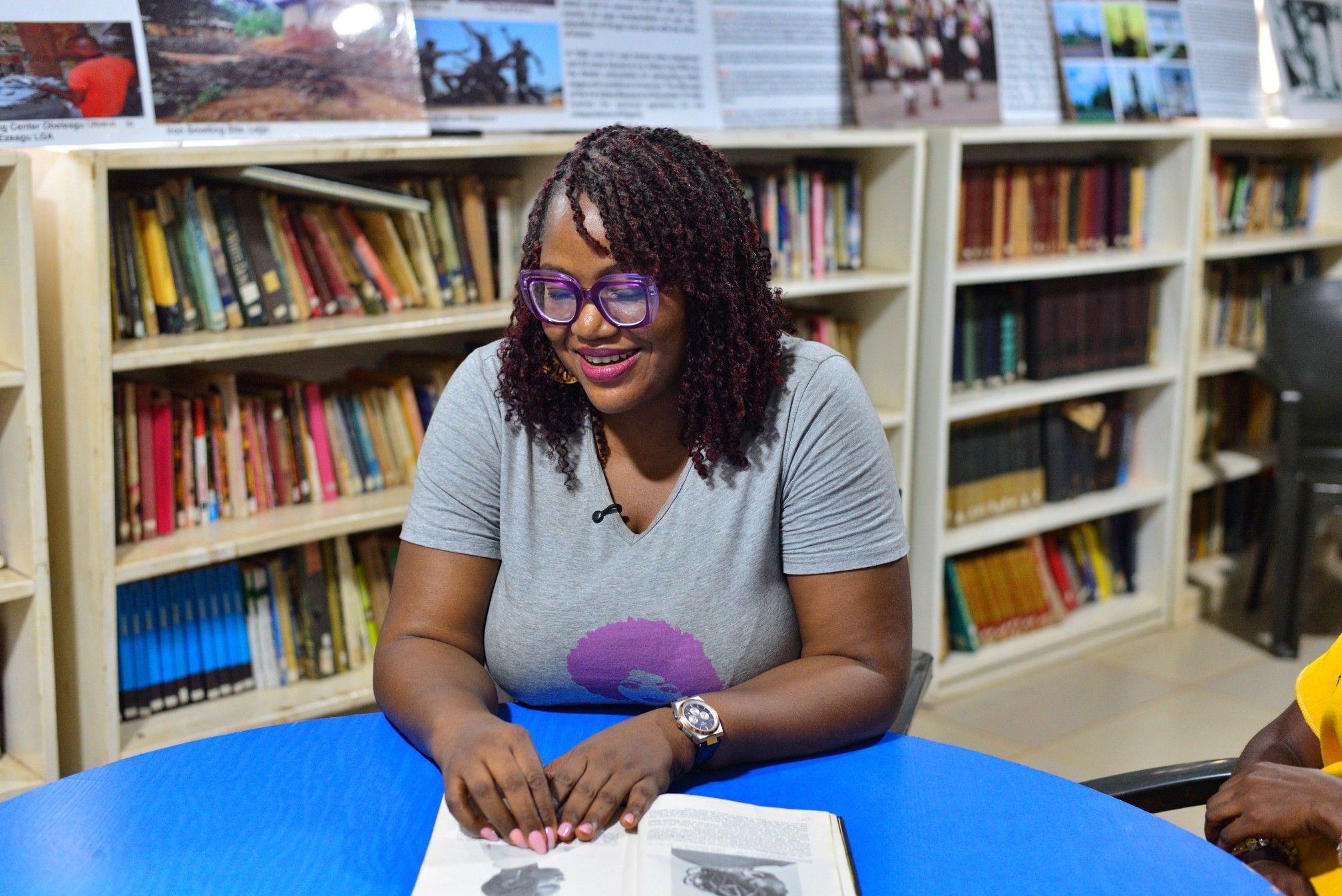Stephen Ikonya Warachi aka IKNY is a remarkable artist. He has a clarity of vision and a boldness of insight that is absolutely refreshing. Eric Rugara had a conversation with him about his paintings, how world-famous painters have influenced his work, and Africa's beautiful art.
Stephen, when did you first know you were an artist?
When I was a kid. I loved drawing a lot.
What about painting? How did you evolve into IKNY the abstract art-making Basquiat of 254?
Haha, I never actually got to paint until I was about 23. IKNY came to be about 3 years ago.
So you just started painting and your unique style emerged?
I never had any formal training and so to me techniques never featured in my art. I just took a brush and painted away. The style has been changing. At first, I was doing realistic paintings. Until I started delving into art history.
When you started painting, was the result different from your previous drawings?
Very. There's more freedom in paint. Not to mention colour.
Do you ever imitate an artist you admire? Basquiat for instance?
I have imitated Basquiat and Van Gogh only. With Basquiat, I was looking for his thinking, his science. With Van Gogh, his passion.
[caption id="attachment_15638" align="alignnone" width="336"] Art by Ikonya Warachi[/caption]
Art by Ikonya Warachi[/caption]
The most powerful thing about your art is colour. What is your philosophy on colour?
Harmony. I judge my art on colour composition. That's how I know when a piece is done. There's that completeness that comes when colour is used well.
Do you plan your colours for a piece in advance?
No, I am the worst planner ever. I just pick a colour and go with the flow.
So your entire process is based on instinct, feeling?
It is. Art must be honest. I trust what I am and that's where I paint from. I let go of the process and observe how it's going from time to time.
Do you ever feel dissatisfied with a piece of work?
I do actually. If and when it happens, then I know that the piece is not done. I will work on it until it is complete. Sometimes I never get the satisfaction and so I abandon the piece.
You are incredibly prolific. You seem to work fast.
Thank you, man. I do work fast, I love it that way. Art/beauty to me is a shooting star. I am the most impatient person I know. I want to do something in a second.
Your paintings look like dreams. Does that make sense to you?
It does. Because they are dreams in a way, in that when I am starting on a work I have no idea what it is I am doing, I can't tell you what it's going to look like once finished. My paintings unfold by themselves, becoming whatever they were to become. Dreams happen without our direction as well (most dreams at least), so yes it does make sense.
[caption id="attachment_15640" align="alignnone" width="500"] Art by Ikonya Warachi[/caption]
Art by Ikonya Warachi[/caption]
I also mean that they are kind of unreal. They are not what we would call realism.
This is true. I don't even know what to call them, really. However, most of them are based on realism...something like seeing the cup for its roundness.
Picasso had that feature in his art too. Do you admire his work?
I admire him as an artist. His audacity above all. His work, not as much. It never struck a chord with me. The only work I love is Demoiselles de Avignon, which I must confess I love because that name is good to throw around especially on a date.
He was prolific too. Guy made over 50,000 artworks in his lifetime.
He was. And he painted with a passion.
What about Leonardo? He was quite precise and exacting. He studied cadavers carefully so as to be anatomically accurate.
He was. I don't really know whether I like da Vinci. His work is like what comes to mind when people talk of great art, especially your average person who may not know much about art. He was a really prolific painter and draughtsman. Heck, I'd say that he was really good at almost everything, or so I think. It's the mystery for me, not the mastery that draws me to Leonardo. He's on another level by himself, I don't think it would do him any justice to call him an artist.
When Hitler went to art school, they said his work was too much like architecture. I suppose they meant he was too precise. Do you think they would have said the same about Leonardo?
I guess with Hitler it is because he mostly painted buildings and how he painted them: he was too technical. Da Vinci however still wows you even if he is precise. He never loses his artistic expression.
Which begs the question: what is artistic expression and how can you tell who has it and who doesn't?
I'd say it's rhythm and soul. You know it when you see it. There's work you can look at and no matter how technical it is, it doesn't exude anything more than that. It is meant to be a painting and nothing more. Most renaissance and baroque works feel that way to me. They are just paintings that showcase skill and technical ability.
Let's talk about Van Gogh.
Ah, yes! Dearest Vincent. He was amazing. I love his colour most. The man was an outstanding colourist. To me, Vinny Van Gogh was the first artist. He got what it was all about.
[caption id="attachment_15643" align="alignnone" width="600"] Art by Ikonya Warachi[/caption]
Art by Ikonya Warachi[/caption]
Why didn't his contemporaries recognize him when he was alive?
People have a hard time accepting the new. Anton Ego said, "The new needs friends". Van Gogh’s work stands out from the rest of the impressionists and post-impressionists because it's very expressionist, with bold strokes and all. I think that people then saw this as lacking in finesse or skill, or some lame mumbo jumbo like that.
And he was really good at drawing too. His pencil drawings are wonderful.
He was. Also, he was a fan of Japanese art and culture as well.
Yes. I think any man of culture has to appreciate Japan. What do you think of Japanese art? It's very minimalist.
Traditionally it is. They had mastered the art of printmaking. Their modern art is crazy though, they too love colour. Some Japanese youngins could even be exhibited as contemporary works of art by themselves.
Imagine a black and white world ...
It would be a 2D world. We would exist only in relation to one or the other. I think it would be really dull and blunt. Too cruel, too strict. No freedom at all and no art.
The Nazis wanted such a world, right? They banned a lot of art, particularly modern art. Strange that Hitler was an artist. I remember reading that in 1939 before the war broke out, he said to the British ambassador: "I am an artist and not a politician. Once the Polish question is settled, I want to end my life as an artist."
They banned anything that went against what they believed in. Hitler was an artist but not a visual artist. I'd say that Hitler himself lived in a black and white world. Most of the past world was black and white. It's what the impressionists and their descendants rebelled against. What Hitler ended up doing is attempting to paint a nation with people as his medium. He was right, he was an artist. Most of Europe was black and white, not like us Africans who had colour and soul and everything nice.
You have strong views about the place of Africa in the art world. Actually, reading those views may be what made me first pay attention to you. I was like, here's a man with a bold and unwavering artistic vision.
I do because I feel that we keep looking down on ourselves. When we look at art, we always look at it from the Western perspective, we take their philosophy of art as a given. I say that is nonsense. A lot of our art lays held up in museums over there and they won't even hear anything about returning the stolen works. We had gone way past techniques and what have you, we must not keep going back there.
Also read: Who Owns African Art?
What is African art to you?
Art made by people of the African continent.
I read somewhere that African art is characterized by rhythm. The dance, the soul ...
It is. It is who we are as a people. We can't help but dance. I wonder how we came to hate ourselves, we are really beautiful beings.
[caption id="attachment_15642" align="alignnone" width="600"] Art by Ikonya Warachi[/caption]
Art by Ikonya Warachi[/caption]
How does a painting dance?
For me, it dances through colour. But it can also dance through form, like our traditional masks. I guess our art has rhythm and dance because we work from and for the spirit.
Unfortunately, most Kenyans haven't learned to appreciate art. Artists still largely depend on the West to make it big financially and for fame.
This is true and sad. I think as a people we have forgotten what art is, we have forgotten what roles artists played in our communities. That's what the colonial process sought to erase among many other things. Our art was always spiritual and a lot of our information as a people was stored in these works of art. What we have now is a people living in fear of starving on arable land. We have been reduced to and reduced ourselves to beasts who labour on farms in exchange for food.
How can we create a thriving creative economy? Like, say Nollywood or Bongo music.
I'd say by remembering our stories. It is there that our creativity is stored. A lot of film and music and art is romanticising history. Our problem is that even historically, our nation's founding is shrouded in mystery and betrayal. And Beyond that, we know almost nothing of ourselves. I think we have also become very archaic in our thinking. We have formed moulds of what we think a man/woman should be and to our own demise as a people. Look at the case in Tanzania: all the artists they have over there, especially male artists, are singers—before they are celebrities—and have been nurtured to be singers. Here, the song is dead, there is no soul in our music and film, because we have chosen to ignore our soul. We must remember who we are as a people.
How about money? How do we get money from the people and into the creative economy, to give artists a good life, to create jobs...
I have no idea. But I'll say that money is a resource just like time and self are. If we are not ready to commit our time and selves first, there will be no money. And if there will be, we will all be reduced to painters of pretty pictures to appease egos with money.
Do you think money devalues art? Like it places a price on something priceless?
Before, I really held that view. Nowadays, no. We must not separate money from the money holder. Since the artist has poured themselves into the work, the admirer pours their selves into the work by paying for it. However, money must not be the end towards which we create. May we all make billions from our works. At least, may I.
Is there a Kenyan or African painter, dead or alive, who you look up to?
Yes, there are. The first one is Michael Soi. He is the quintessential Kenyan Artist if you ask me. Then the late Tanzanian Edgar Said TingaTinga—the man started an art movement by himself. I'd say those two are the ones who I look up to most. There are others like Peterson Kamwathi and Bushkimani Moira.
Why abstract art?
It is unbound. It is a great tool for exploring the subconscious and reprogramming as well.
How can people buy your work?
By reaching out to me on Instagram, or via my website. Instagram is where I am most active. DM me, let's talk. I also do voiceover work by the way.
Alright. This was great. Thanks for taking the time to answer these many questions.
Thank you for making time to ask them.





